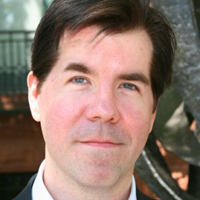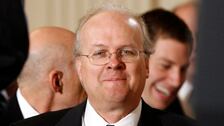
When asked to discuss Karl Rove's memoir, the temptation is to linger on its title. With far more justification, Ronald Reagan might have called his own book, Courage and Consequence: My Life as a Conservative in the Fight. Instead the Gipper chose the more modest, An American Life. That, of course, was so Reagan. Which is why Karl Rove's title is perfect. Because it is so Karl Rove. (His backup title, presumably, was Not Since Churchill.)
As a senior staffer in the Bush administration, I came to know of Rove like nearly everyone else. We had a few indirect interactions over personnel, which his operatives were blocking at the Department of Defense, just like at the Department of Justice, for no reason more important than that they could. (One of his DoD operatives later became part of the Obama birther movement.) But it was in his final year in the Bush administration, when I joined him at the White House, that I saw up close the man called "Bush's Brain"—though I should note that, contrary to legend, the president actually had a pretty good one of his own.
When Bush came into the airplane's conference room to question the necessity of an upcoming political event, Rove flatly refused to hear him out. "Never give an inch," he muttered as the president walked off.
It was, admittedly, a difficult time for Rove. He was besieged by investigations, some politically motivated; in numerous tussles with other staffers for the president's ear; and stung by the false assurances he made that Republicans under his guidance would cling to control of at least one house of Congress in 2006. And yet in a White House known for bland, standard-issue Republicans, Rove remained its iconic presence—a traveling circus show, a cavalcade kicking up a cloud of dust¸ Dilbert and Pigpen meet Machiavelli.
• The 10 Biggest Scoops from Rove’s MemoirI first encountered him when he walked into my office, without knowing me, to offer me one of his wife's homemade brownies. (They were perfect.) Rove's pranks were notorious, such as when he moved another staffer's car in the West Wing, leaving him to wonder if it was stolen. Or when Rove pretended at one senior staff meeting to be a waiter serving dinner to the likable but protocol-conscious National Security Advisor Stephen Hadley. He engaged in a reading contest with President Bush to see who could get through the most books the fastest, with less emphasis on how much of the books they'd actually absorbed. (They were reading something like an entire book every two to three days.)
To the speechwriters, he was the hobgoblin of editors, demanding we cram in more statistics, more attacks, more examples. Always more. His edits often were indecipherable, mysterious marks on the side of the page written with a Sharpie. When I made it my mission to get at least one speech through the process without a single Rove edit, people laughed at my quixotic moxie. I remember fondly the shock on our assistant's face—not to mention my own—when I actually pulled it off. Getting Rove's approval was almost better than the president's. Though his mark of excellence was not, as his fiercest critics would tell you, simply a "666."
He was given a daunting portfolio—in charge of politics, policy issues, and ultimately personnel, with dozens of agencies and offices reporting to him. Some people could handle all that power with grace and perspective. Others followed Rove's course. Because he was given control of seemingly everything, he tended to want to control, well, everything. I remember one speech I wrote in which Rove battled nearly every official in the White House, including the president, over the proper placement of a single paragraph. It was a small issue, to be sure. Which only made his man-the-barricades mania more frightening. If this is what he did to a paragraph in a forgettable speech, what pray tell did he do to something that really mattered? It was at this point that chief speechwriter Bill McGurn alerted us that Rove was becoming "unhinged" and reported that other close Bush confidantes such as communications advisor Dan Bartlett were exhausted from dealing with him. When, as West Wing rumor had it, senior officials suggested it might be nice for Rove to take a vacation from the White House—a permanent one—few of his colleagues exactly hurled themselves in front of the exits. Rove told reporters he resigned due to a deadline that had been imposed on senior officials to announce their departure plans. The explanation was classic Washingtonspeak—convincing in the moment but, in hindsight, not exactly accurate.
Aboard Air Force One for his final ride as a member of the staff, I saw a mini-parade of the many faces of Rove. I sat next to him while he shouted on the phone with some poor soul in Idaho over the then-unfolding Larry Craig scandal. As we landed in Nevada, he pointed out, somewhat wistfully, where he grew up. When the president and First Lady gave him a surprise farewell party, complete with red velvet cake, he surprised everyone with his visible emotion. Then, when Bush came into the airplane's conference room to question the necessity of an upcoming political event, Rove flatly refused to hear him out. "Never give an inch," he muttered as the president walked off.
That mantra, of course, was the secret of his remarkable success and the root of his ultimate undoing. An effective advocate when things were going his way—such as rallying support for the invasion of Iraq—he proved needlessly divisive when things went wrong. He, and Bush, suggested that conservatives who opposed his immigration proposals were xenophobes, racists, fools, or cowards, earning lasting enmity in the process. He supported big-government conservatism that alienated many in the base, some of whom joined the tea party movement. He failed to articulate a conservative vision in favor of short-term tactics and maneuvers. "They were determined to run a base mobilization, narrow margin victory," former Speaker Newt Gingrich recently charged, "largely because they were SO uncomfortable with ideas." The result was one election in which we lost the popular vote, another when Republicans barely defeated liberal John Kerry, and two disastrous elections in 2006 and 2008. President Bush left office with a 22 percent approval rating and the GOP, as Jed Babbin, the editor of the conservative newspaper Human Events once put it, was left "a smoking hole in the ground." In short, Rove's approach left the GOP about as popular as the dress Sarah Jessica Parker wore to the Oscars.
And yet Rove still doesn't seem to have figured it out. He advised Senator Kay Bailey Hutchison to wage last week's losing campaign against the sitting Republican governor of Texas—wounding both officials and the Texas GOP in the process—to score points in his ongoing feud with Governor Perry. The worst-kept secret in Washington is that his associates are behind many of the anonymous Republican attacks on the current chairman of the Republican National Committee, attacks which by complete coincidence of course always seem to make Rove and his allies come out in a better light. And though he is a useful, sometimes brilliant commentator on Fox News, one hopes that he and his compatriots are not trying to run the network as they ran the White House, by urging bookers to keep disfavored people off the airwaves. One suspects Roger Ailes would not put up with that.
One day soon perhaps Rove, with his love of history, will learn the lesson of the former president he says he reveres. Ronald Reagan kept a sign on his desk that said, "There is no limit to what a man can do or where he can go if he doesn't mind who gets the credit." Reagan, at least, didn't believe in his own greatness as much as he believed in the greatness of the ideas that he stood for.
Matt Latimer is the author of the New York Times bestseller, SPEECH-LESS: Tales of a White House Survivor. He was deputy director of speechwriting for George W. Bush and chief speechwriter for Donald Rumsfeld.






